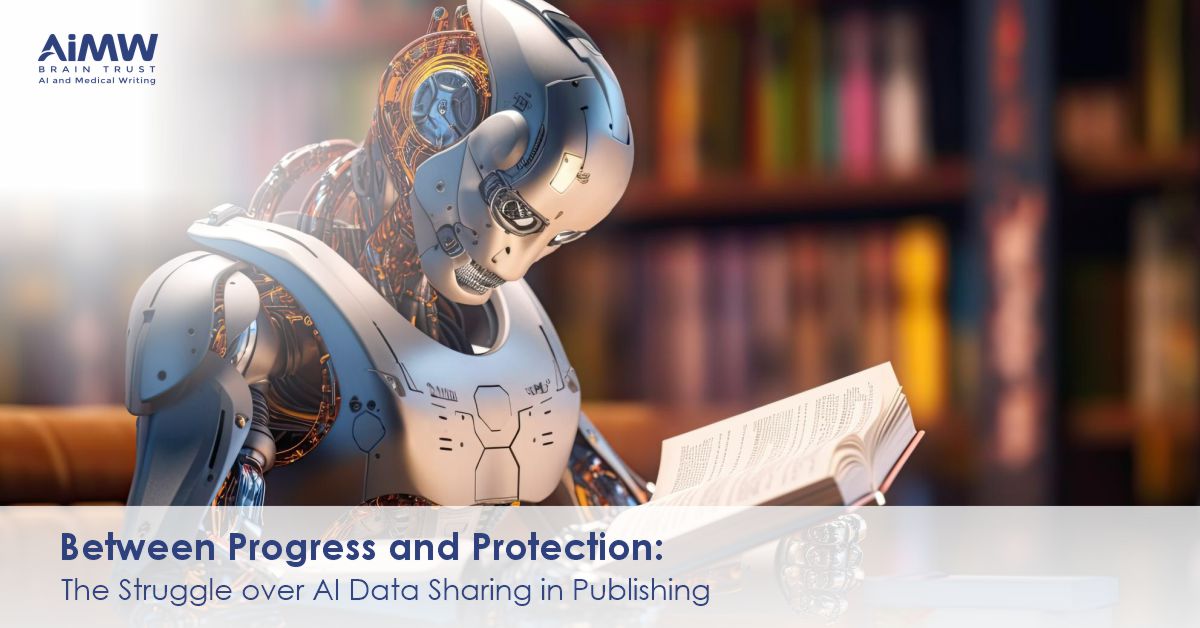The emergence of Artificial Intelligence (AI), particularly generative AI, has sent shockwaves through various sectors including academia. While some have embraced its potential with open arms, others remain hesitant and reluctant about its integration at their workplace. It’s widely acknowledged that the efficacy of generative AI is significantly dependent on the quality of the training data. However, a notable concern persists due to the lack of transparency surrounding the origin of data being used to train the large language models (LLMs). Developers frequently work with a considerable degree of secrecy, leaving stakeholders in academia unsure about the origins and methodologies utilized during the training process. This opacity raises valid concerns regarding data security and ethics not only in academia but also in corporate medical and scientific communication agencies.
In the absence of robust policies for AI with respect to the training of large language models, it’s evident that the publication industry is polarized within two factions.
On one side, there exists a group of individuals and organizations who are willing to collaborate with generative AI model developers and believe in the power of working together to design an efficient system for processing and generating content. On the other hand, there is another set who opposes the idea of their data being used for training AI models and rightly so. They harbor a concern about the potential misuse of their client’s (in this case authors, researchers, scientists) data being used. This group is adamant about safeguarding their data from being exploited without proper consent. Each faction has its own set of reasons for its stance on this issue.
Click Here:- Enhancing Your Manuscript: Essential Tools and Tips for Medical Writers
Individuals within the group advocating collaboration with generative AI see a broader potential for such collaboration. They believe it could simplify researchers’ lives by providing access to a wealth of high-quality open, licensed, and proprietary content and data. They believe that well-trained LLMs could speed up accessing vast scholarly content, ultimately aiding the academic, research, and scientific community in achieving its objectives efficiently. Moreover, they are of the opinion that embracing generative AI in alignment with academic standards not only fosters efficiency but also maintains integrity within the research process. By adhering to ethical guidelines and respecting intellectual property rights, this collaborative approach ensures that advancements in AI technology serve to enrich scholarly endeavors rather than compromise them.
Conversely, the group advocating for data protection raises a plethora of concerns regarding the data utilization in training LLMs. They perceive generative AI models are engaging in what they term as “AI mining” of important research data. Their apprehension revolves around the potential for copyright infringement and unauthorized use of their data without consent or compensation. These individuals raise their concerns about the lack of control over how their data is being used for training LLMs, emphasizing the need for stringent laws to protect intellectual property rights. Moreover, there is ongoing discourse regarding the accessibility of the data used for LLM training, with some asserting that while certain datasets may be openly available online, access might be restricted to abstracts rather than full-text articles.
The crux of their argument lies in the assertion that the current practices surrounding AI data usage in publishing lack transparency and fail to adequately address the ethical implications of utilizing proprietary data for training purposes.
Another significant concern revolves around the absence of standardized guidelines and global laws pertaining to AI model training. As a result, publishers are advocating for comprehensive regulations to ensure transparency regarding the data usage for training AI models and to uphold ethical data practices. This demand reiterates the urgent need for clear and robust guidelines to govern the ethical usage of data in AI development, addressing concerns including transparency and accountability.
While the publishers express concern regarding data mining, AI model developers offer a contrasting perspective. They acknowledge the utilization of openly available online data to train AI models but emphasize that the generated outcomes on AI platforms are not direct reproductions of the original data. Instead, these results undergo paraphrasing, wherein AI models process the data based on learned patterns and algorithms. This point is crucial indicating AI models not just replicate the data, but they generate novel outputs from the existing data. Hence, it is essential to understand where the data comes from and how it gets processed in the AI models.
As we navigate through this complex terrain, it is the need of the time for all the stakeholders to engage in meaningful dialogue, to confront these challenges with courage and integrity, and to find a solution toward a future where AI serves as a force for good, enriching research and development. Utilizing AI for expanding the boundaries of human knowledge and imagination is one of the vital aspects of training AI for a better world.
By looking at the current scenario around the usage of generative AI, what are your thoughts on the ethical dilemmas surrounding AI data usage in the publishing sector? Do you believe that collaborative efforts between publishers and AI developers can strike a balance between innovation and ethical responsibility? Or do you envision a colluded space where research integrity is a lost case? Let’s engage in a dialogue where each one of us plays an important role in creating a responsible AI-integrated space for medical and scientific communications and uphold the soul of authentic research and transparent process.






































